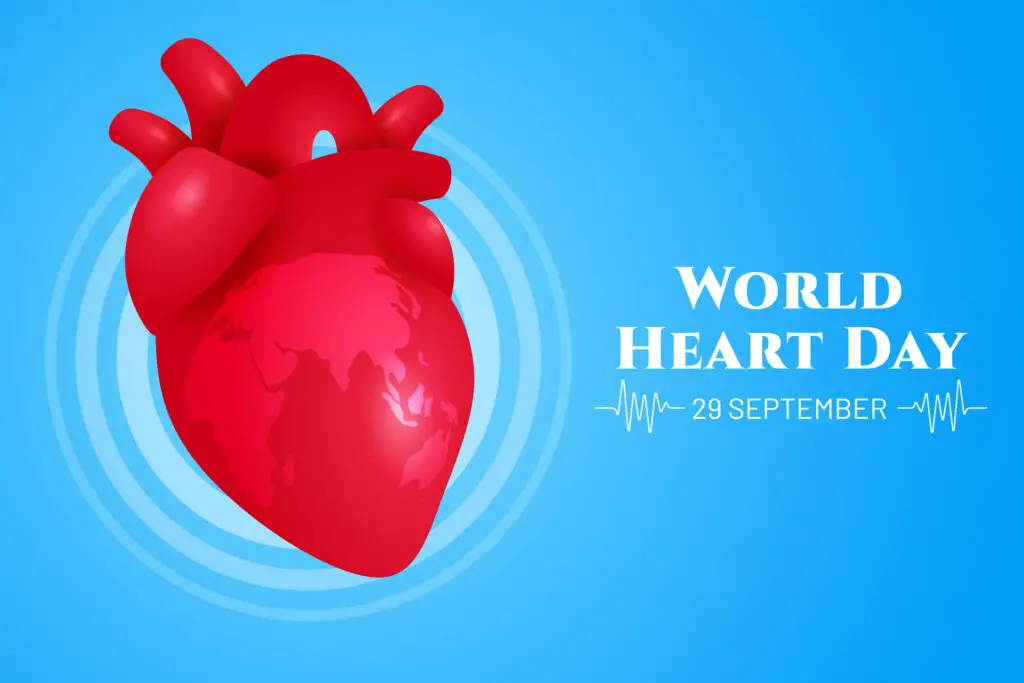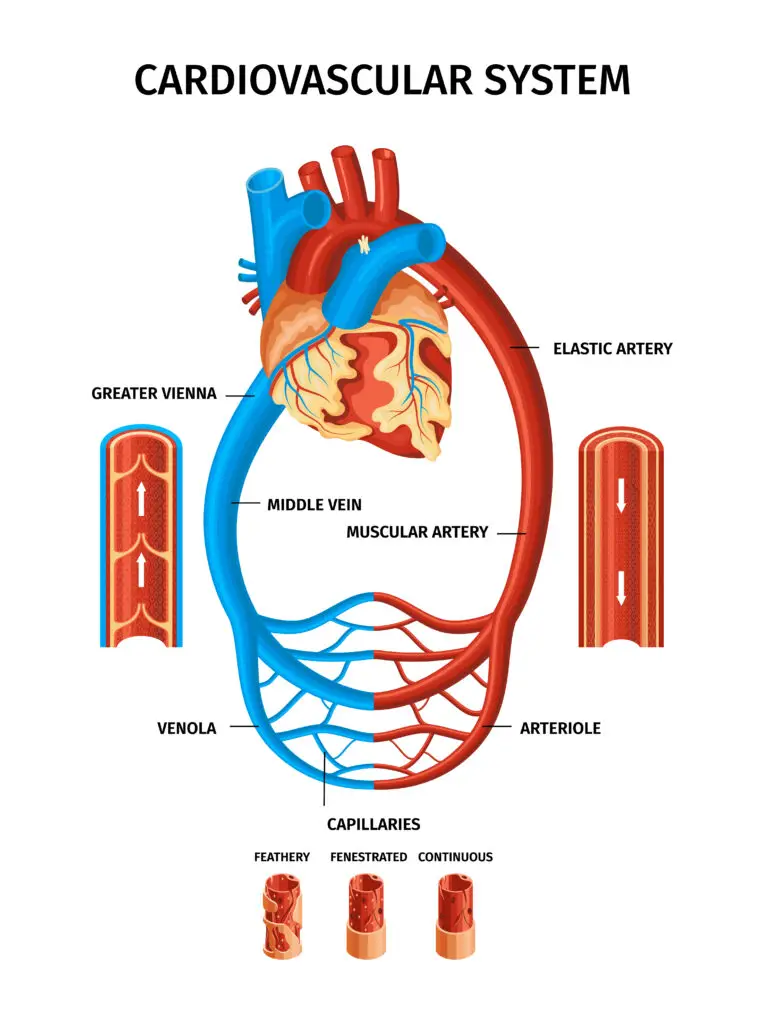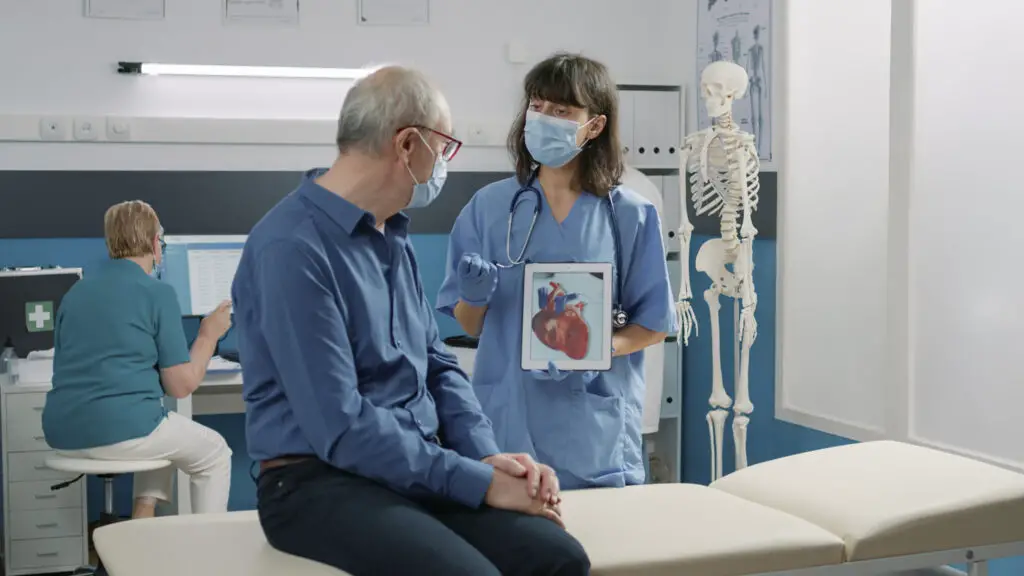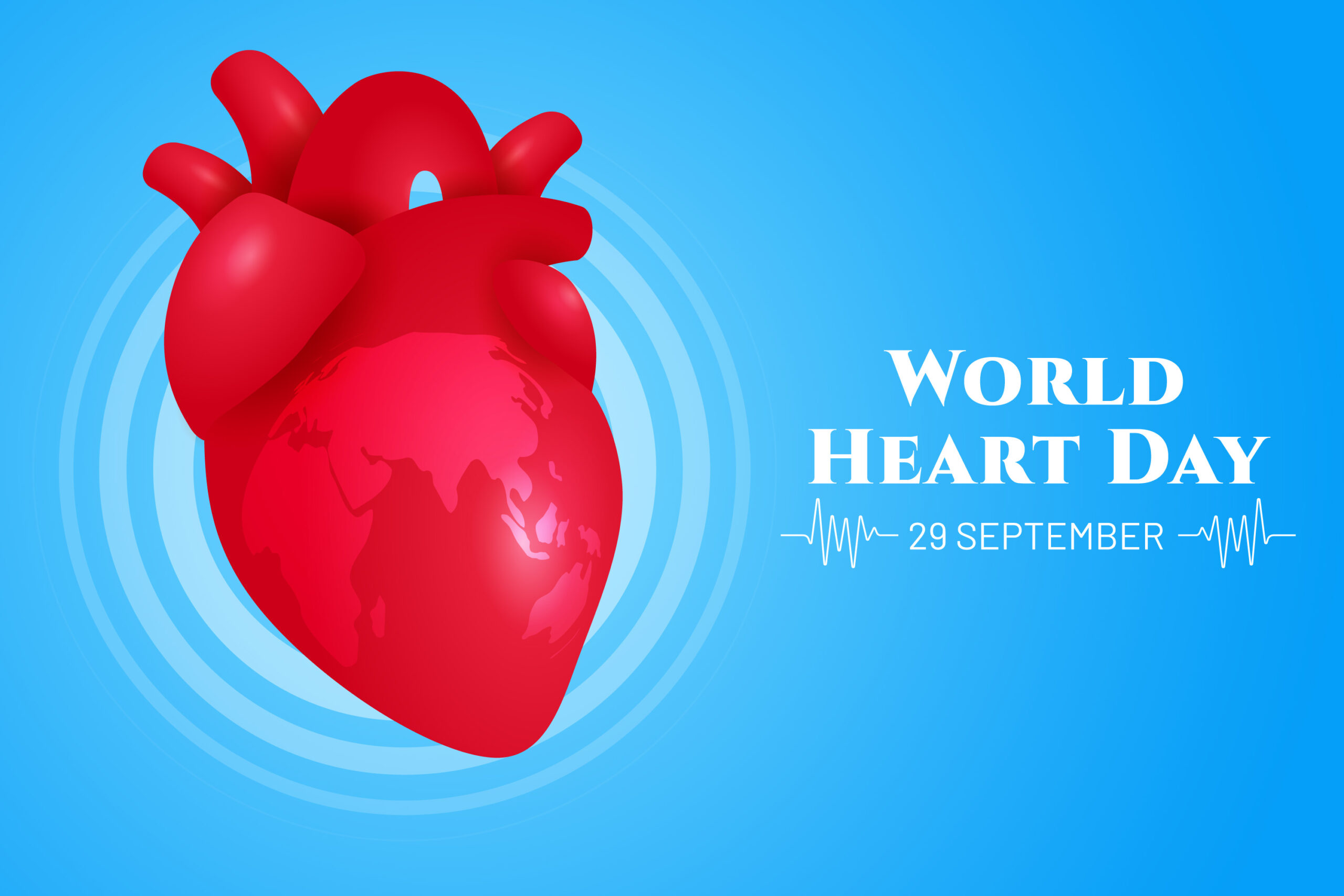
Introduction
World Heart Day, observed on the 29th of September each year, stands as a global call to action against the world’s leading cause of death: cardiovascular diseases. This day reminds us that our hearts are not just muscular organs tirelessly pumping blood; they are the life force that sustains us. World Heart Day, since its inception in 2000, has been dedicated to spreading awareness about cardiovascular health, promoting heart-healthy lifestyles, and encouraging individuals to take proactive steps to protect their hearts.
Table of Contents
World Heart Day 2023: A Comprehensive Guide to Cardiovascular Health
Understanding Cardiovascular Health
Defining Cardiovascular Health
Cardiovascular health is more than the absence of disease; it’s the intricate harmony of various components working together seamlessly. It encompasses the robust functioning of the heart, efficient circulation of blood, and the overall well-being of the cardiovascular system. Achieving and maintaining cardiovascular health is a lifelong commitment that pays dividends in the form of a longer, healthier life.
The Importance of a Healthy Heart
The heart, that remarkable organ responsible for pumping blood through our intricate network of blood vessels, deserves our attention and care. It’s more than just a mechanical pump; it embodies the essence of life itself. A healthy heart ensures that every cell in our body receives the oxygen and nutrients it needs to function optimally.
This intricate network of blood vessels, often stretching over 60,000 miles in total length, relies on the heart’s ceaseless rhythm to keep it all going. The heart’s four chambers, the atria and ventricles, work in perfect harmony to maintain circulation.
Common Heart Conditions
Coronary Artery Disease
Coronary artery disease (CAD) is a relentless adversary of the heart. It occurs when cholesterol-laden plaques build up in the coronary arteries, reducing blood flow to the heart muscle. These plaques can rupture, leading to the formation of blood clots and potentially causing heart attacks. The symptoms of CAD can range from angina (chest pain) to life-threatening myocardial infarctions (heart attacks).
Heart Failure
Heart failure doesn’t mean that the heart has stopped working; rather, it signifies that the heart can’t pump blood as efficiently as it should. This condition can result from various factors, including high blood pressure, heart valve diseases, and coronary artery disease. Heart failure can manifest with symptoms like feeling tired, experiencing difficulty breathing, and retaining excess fluid in the body.
Arrhythmias
The heart’s rhythm is typically a well-orchestrated beat, but sometimes, it becomes irregular, leading to arrhythmias. These abnormalities in heart rhythm can vary from harmless palpitations to life-threatening conditions. Diagnosing and managing arrhythmias is essential to ensure the heart’s proper function.
Valvular Heart Disease
Valvular heart disease involves issues with the heart’s valves, which control blood flow. Valves can become damaged or defective, impairing blood flow and leading to symptoms like chest pain, fatigue, and shortness of breath. Treatment may involve medication or surgical intervention, such as valve replacement.

World Heart Day 2023: A Comprehensive Guide to Cardiovascular Health
Risk Factors for Heart Diseases
Genetics and Heart Health
While genetics play a role in cardiovascular health, it’s only part of the story. Family history can provide insights into potential risks, but lifestyle choices often exert a more significant influence on heart health. Understanding your family’s heart history can help you make informed decisions about your health.
Lifestyle Choices and Heart Health
Diet and Nutrition
A heart-healthy diet is a cornerstone of cardiovascular well-being. The food we consume directly affects our heart’s health. Diets rich in fruits, vegetables, whole grains, lean proteins, and healthy fats can significantly reduce the risk of heart diseases.
Physical Activity
Regular physical activity is like a tonic for the heart. Exercise bolsters the heart muscle, enhances blood flow, and aids in keeping a healthy body weight. Exercise also releases endorphins, reducing stress and promoting a positive mood.
Smoking and Tobacco Use
Smoking and the use of tobacco products are among the most significant risk factors for heart diseases. The harmful chemicals in tobacco can damage the heart and blood vessels, leading to the development of atherosclerosis (hardening of the arteries), which can culminate in heart attacks.
Alcohol Consumption
Moderate alcohol consumption may offer some cardiovascular benefits, particularly for heart health. However, excessive alcohol consumption can have the opposite effect, increasing the risk of heart diseases. It’s essential to strike a balance and consume alcohol in moderation.
Stress and Mental Health
Chronic stress can take a toll on the heart. It triggers the release of stress hormones, which can contribute to high blood pressure and inflammation. Managing stress through techniques like meditation, mindfulness, and yoga can have a calming effect on the heart.

World Heart Day 2023: A Comprehensive Guide to Cardiovascular Health
Prevention and Lifestyle Modifications
Importance of Prevention
Preventing heart diseases is more effective and less costly than treating them. Embracing a heart-healthy lifestyle from an early age can significantly reduce the risk of developing heart conditions later in life. Prevention starts with education and awareness.
Dietary Guidelines for a Healthy Heart
Mediterranean Diet
The Mediterranean diet stands out as an excellent example of a diet that’s good for your heart. It emphasizes whole foods like fruits, vegetables, whole grains, nuts, and olive oil while limiting processed foods and red meat. This diet is rich in antioxidants, healthy fats, and fiber, all of which support cardiovascular health.
DASH Diet
The Dietary Approaches to Stop Hypertension (DASH) diet is specifically designed to lower high blood pressure. It promotes the consumption of potassium-rich foods like fruits and vegetables and limits sodium intake. Adhering to the DASH diet can help reduce the risk of heart diseases.
Exercise and Its Impact on Cardiovascular Health
Aerobic vs. Strength Training
Both aerobic exercise (like walking, running, and swimming) and strength training (using weights or resistance bands) offer unique benefits for the heart. Aerobic exercise enhances cardiovascular endurance, while strength training helps build lean muscle mass, which can improve metabolism and overall heart health.
Recommended Physical Activity Levels
For adults, the American Heart Association suggests getting a minimum of 150 minutes of moderate-intensity aerobic activity or 75 minutes of vigorous-intensity aerobic activity per week. Furthermore, it’s advisable to engage in muscle-strengthening exercises on at least two days every week.
Smoking Cessation Strategies
Quitting smoking is arguably the most crucial step one can take for heart health. When you quit smoking, you’ll begin to experience benefits almost right away, including better blood circulation and improved lung function. Various smoking cessation strategies, including nicotine replacement therapy and counseling, are available to help individuals quit.
Limiting Alcohol Intake
While moderate alcohol consumption can have some cardiovascular benefits, it’s essential to define what “moderate” means. For men, moderate drinking means up to two drinks per day, while for women, it’s up to one drink per day. Drinking too much alcohol can result in high blood pressure, heart failure, and even strokes.
Stress Management Techniques
Meditation and Mindfulness
Meditation involves focused attention and controlled breathing to calm the mind and reduce stress. Mindfulness, a form of meditation, encourages staying present in the moment. Both practices can help lower blood pressure and reduce the risk of heart diseases.
Yoga for Heart Health
Yoga combines physical postures, breathing exercises, and meditation to promote relaxation and flexibility. Practicing yoga regularly can reduce stress, lower blood pressure, and improve heart health.

World Heart Day 2023: A Comprehensive Guide to Cardiovascular Health
Screening and Diagnosis
The Role of Regular Check-ups
Regular medical check-ups are essential for assessing your overall health, including your heart’s well-being. During these visits, your healthcare provider may check your blood pressure, cholesterol levels, and ask about your lifestyle to gauge your risk of heart diseases.
Blood Pressure Monitoring
High blood pressure (hypertension) is a significant risk factor for heart diseases. It often presents without symptoms, making regular blood pressure checks crucial. If hypertension is detected, lifestyle changes and, in some cases, medications can help manage it.
Cholesterol Testing
Cholesterol is a waxy substance that can build up in the arteries, leading to atherosclerosis. Cholesterol testing measures the levels of various cholesterol types, including low-density lipoprotein (LDL) and high-density lipoprotein (HDL). High LDL cholesterol is associated with an increased risk of heart diseases.
EKG and ECG
Electrocardiograms (EKGs or ECGs) are diagnostic tests that record the heart’s electrical activity. They can detect irregular heart rhythms and provide insights into heart health. EKGs are often used in routine check-ups and when evaluating symptoms like palpitations.
Cardiac Imaging
Echocardiogram
An echocardiogram is a medical test that doesn’t require any invasive procedures. It relies on sound waves to produce detailed images, providing insights into both the structure and function of the heart. It can reveal abnormalities in heart valves, chambers, and muscle, aiding in the diagnosis of various heart conditions.
Angiography
Angiography is an invasive procedure used to visualize blood vessels, including the coronary arteries. It is often performed when there is suspicion of significant blockages. During angiography, a contrast dye is injected into the blood vessels, allowing for clear X-ray imaging.
Treatment Options
Medications for Heart Conditions
Statins
Statins are medications that lower cholesterol levels by inhibiting an enzyme involved in cholesterol production. They are commonly prescribed to reduce the risk of heart diseases, particularly in individuals with high cholesterol levels. Statins have been shown to decrease the risk of heart attacks and strokes.
Beta-Blockers
Beta-blockers are a class of medications that block the effects of adrenaline on the heart. They are used to manage high blood pressure, angina (chest pain), and arrhythmias. Beta-blockers can reduce heart rate and blood pressure, relieving the heart’s workload.
ACE Inhibitors
Angiotensin-converting enzyme (ACE) inhibitors relax blood vessels, making it easier for the heart to pump blood. They are often prescribed to manage high blood pressure and heart failure. ACE inhibitors can improve symptoms and reduce the risk of heart-related complications.
Antiarrhythmics
Antiarrhythmic medications are used to regulate irregular heart rhythms. There are different classes of antiarrhythmics, each targeting specific types of arrhythmias. The choice of medication depends on the type and severity of the arrhythmia.
Surgical Interventions
Angioplasty and Stent Placement
Angioplasty is a medical procedure performed to widen coronary arteries that have become narrowed or blocked. A catheter with a small balloon is inserted into the artery and inflated to widen the vessel. Often, a stent (a small mesh tube) is placed to keep the artery open, allowing for improved blood flow to the heart muscle.
Coronary Artery Bypass Grafting (CABG)
Coronary artery bypass grafting, commonly known as CABG or bypass surgery, is a surgical procedure used to treat severe coronary artery disease. During CABG, blood vessels from other parts of the body are used to bypass blocked coronary arteries, restoring blood flow to the heart.
Valve Replacement Surgery
Valve replacement surgery is performed to replace damaged or malfunctioning heart valves. There are two main types of replacement valves: mechanical valves (made of metal or other durable materials) and biological valves (made from human or animal tissue). The choice of valve depends on individual factors, including age and overall health.
Lifestyle Changes as Treatment
In many cases, lifestyle modifications can be as effective as medications and surgeries in managing heart conditions. These changes involve embracing a diet that’s good for your heart, incorporating regular physical activity, quitting smoking, and effectively handling stress.
Cardiac Rehabilitation
Cardiac rehabilitation programs offer structured support and guidance for individuals recovering from heart events or surgeries. These programs usually consist of training for physical exercise, educating participants on heart-healthy lifestyles, and providing emotional support. Engaging in cardiac rehabilitation can improve recovery and long-term outcomes.

World Heart Day 2023: A Comprehensive Guide to Cardiovascular Health
World Heart Day 2023 Campaign
Theme and Objectives
World Heart Day 2023 carries the theme of “Heart Health for All.” The campaign focuses on ensuring that everyone, regardless of age, gender, or socioeconomic status, has access to the information, resources, and support needed to maintain good heart health. The objectives of the campaign include raising awareness about heart health disparities and promoting equitable access to cardiovascular care.
Global Events and Initiatives
World Heart Day is a global event celebrated in nearly every country. Organizations, healthcare providers, and communities around the world organize various events and initiatives to spread awareness about cardiovascular health. These can include health fairs, educational seminars, and fitness activities.
Importance of Participation
Participating in World Heart Day events and initiatives is a meaningful way to contribute to the global effort to promote heart health. By taking part in local activities, individuals can raise awareness, support research, and advocate for policies that prioritize heart health. Organizations can also demonstrate their commitment to employee well-being by participating in workplace wellness programs.
Innovations in Cardiovascular Medicine
The field of cardiovascular medicine is continually evolving, with innovations that promise to transform the way we diagnose and treat heart diseases. These advancements hold the potential to improve patient outcomes, reduce complications, and enhance overall quality of life.
Advancements in Heart Surgery Techniques
Modern heart surgery techniques have become less invasive, resulting in shorter recovery times and reduced complications. Minimally invasive procedures, such as robotic-assisted surgery, allow surgeons to operate with greater precision, reducing the impact on patients’ bodies.
Breakthrough Medications
Pharmaceutical research continues to yield new medications that target specific aspects of heart diseases. These medications can help manage conditions like high blood pressure, cholesterol imbalances, and heart failure more effectively, often with fewer side effects.
Wearable Technology for Heart Health Monitoring
Wearable devices like smartwatches and fitness trackers now offer continuous heart rate monitoring, allowing individuals to track their heart health in real time. These devices can detect irregular heart rhythms, monitor physical activity, and provide valuable data for healthcare providers.
Artificial Intelligence in Cardiovascular Care
Artificial intelligence (AI) is making its mark in the realm of cardiovascular care. AI algorithms can analyze medical images, such as echocardiograms, with remarkable accuracy, aiding in the early detection of heart conditions. AI-driven risk assessment models also help identify individuals at higher risk of heart diseases, allowing for targeted interventions.

World Heart Day 2023: A Comprehensive Guide to Cardiovascular Health
Cardiovascular Health Across the Lifespan
Childhood Heart Health
Fostering heart health from childhood is paramount to ensuring a lifetime of well-being. Parents and caregivers play a crucial role in instilling healthy habits in children. Encouraging active play, providing nutritious meals, and setting a positive example can establish a strong foundation for heart health.
Heart Health in Adolescents
Adolescence is a pivotal time for heart health, as habits formed during this period can have a lasting impact. Adolescents should be encouraged to stay physically active, make nutritious food choices, and avoid risky behaviors like smoking.
Adult Heart Health
As individuals transition into adulthood, the responsibilities of maintaining heart health become more apparent. Regular check-ups, healthy eating, exercise, and stress management all contribute to a heart-healthy lifestyle. Adults should be aware of their risk factors and take proactive steps to mitigate them.
Geriatric Heart Health
With aging comes an increased risk of heart diseases. Geriatric heart health involves managing existing conditions, such as hypertension and diabetes, and making necessary lifestyle adjustments. Regular medical check-ups become even more critical as individuals age.
Special Considerations
Women’s Heart Health
Gender Differences in Heart Disease
Heart diseases can manifest differently in women than in men, and women often experience unique risk factors. Understanding these gender-specific differences is crucial for accurate diagnosis and effective treatment. Women should be aware of symptoms like chest pain, shortness of breath, and fatigue, which can differ from the classic “Hollywood heart attack.”
Pregnancy and Heart Health
Pregnancy places additional stress on the heart, particularly in women with pre-existing heart conditions. Proper prenatal care and close monitoring are essential to ensure a healthy pregnancy. Some heart conditions may require specialized care during pregnancy.
Heart Health in Athletes
Exercise-Induced Heart Conditions
Athletes, both professional and recreational, face specific cardiovascular challenges. Intense physical training can lead to exercise-induced heart conditions, including arrhythmias. Athletes should undergo regular cardiac evaluations to ensure their hearts can withstand the demands of their sport safely.
Heart Health in Patients with Chronic Illnesses
Diabetes and Heart Disease
Diabetes and heart disease are intertwined, sharing common risk factors such as obesity and high blood pressure. Managing blood sugar levels and maintaining a heart-healthy lifestyle are critical for individuals with diabetes to reduce their risk of heart diseases.
Kidney Disease and Heart Health
The kidneys and the heart share a closely intertwined relationship. Kidney disease can lead to heart problems, and heart conditions can strain the kidneys. Managing kidney health through a balanced diet, proper hydration, and medication adherence is essential for individuals with kidney disease.

World Heart Day 2023: A Comprehensive Guide to Cardiovascular Health
Support and Resources
Nonprofit Organizations Dedicated to Heart Health
Numerous nonprofit organizations are committed to promoting heart health and supporting individuals living with heart conditions. These organizations provide resources, educational materials, and advocacy efforts to improve cardiovascular health on a global scale. Some well-known organizations include the American Heart Association, the British Heart Foundation, and the World Heart Federation.
Online Communities and Support Groups
The internet has facilitated the creation of online communities and support groups for individuals dealing with heart diseases. These platforms offer a safe space for individuals to connect, share their experiences, and seek advice. Patients can find solace in knowing they are not alone in their journey towards better heart health.
Accessible Information for Patients
Access to accurate and understandable information is vital for individuals seeking to improve their heart health. Reliable sources of information include healthcare provider websites, government health agencies, and reputable medical organizations. Patients should feel empowered to ask questions and seek clarification from their healthcare providers to make informed decisions about their heart health.
Conclusion:
World Heart Day 2023: A Comprehensive Guide to Cardiovascular Health
As we commemorate World Heart Day in 2023, it serves as a poignant reminder of our collective responsibility to safeguard our hearts. Our hearts are not mere organs; they are the guardians of life itself. Through understanding the significance of this day, recognizing the risk factors for heart diseases, embracing prevention and lifestyle modifications, and staying informed about the latest innovations in cardiovascular medicine, we can collectively make strides toward a world where heart diseases no longer claim countless lives prematurely.
This World Heart Day, let us pledge to nurture our most vital organ and spread awareness of the significance of cardiovascular health. Whether you are young or old, male or female, an athlete or someone managing a chronic illness, there are steps you can take to prioritize your heart. By doing so, we honor not only our own lives but the lives of those we love and the generations yet to come. Let us make every day a celebration of heart health, for the heart is not merely an organ; it is the essence of life itself.
If you found this article informative and inspiring, please consider sharing it with others to raise awareness about the importance of cardiovascular health. Together, we can make a difference in the fight against heart diseases.

Frequently Asked Questions (FAQs):
World Heart Day 2023: A Comprehensive Guide to Cardiovascular Health
1. What is World Heart Day, and why is it important?
Answer: World Heart Day is observed annually on September 29th to raise awareness about cardiovascular health and promote heart-healthy lifestyles. It’s crucial because cardiovascular diseases are the leading cause of death globally, and this day encourages individuals to prioritize their heart health.
2. What are the common symptoms of heart failure?
Answer: Common symptoms of heart failure include fatigue, shortness of breath, fluid retention (edema), rapid or irregular heartbeat, persistent coughing or wheezing, and swollen ankles, legs, or abdomen.
3. How can I improve my heart health through lifestyle changes?
Answer: Lifestyle modifications can significantly improve heart health. These include adopting a heart-healthy diet, engaging in regular physical activity, quitting smoking, moderating alcohol consumption, and practicing stress management techniques like meditation and yoga.
4. What are some innovative advancements in cardiovascular medicine?
Answer: Innovations in cardiovascular medicine include less invasive heart surgery techniques, breakthrough medications, wearable technology for heart monitoring, and the integration of artificial intelligence in diagnosing and managing heart conditions.
5. What is the recommended amount of exercise for heart health?
Answer: The American Heart Association recommends at least 150 minutes of moderate-intensity aerobic activity or 75 minutes of vigorous-intensity aerobic activity per week for adults. Additionally, muscle-strengthening activities should be performed on at least two days a week.
6. How does stress affect heart health, and what can I do to manage stress?
Answer: Chronic stress can negatively impact heart health by raising blood pressure and increasing inflammation. Managing stress through techniques like meditation, mindfulness, yoga, and seeking support from mental health professionals can help reduce its impact on the heart.
7. What are the key components of a heart-healthy diet?
Answer: A heart-healthy diet includes plenty of fruits, vegetables, whole grains, lean proteins, and healthy fats like those found in olive oil. It minimizes processed foods, saturated and trans fats, and excessive salt.
8. What role does family history play in heart health?
Answer: Family history can provide insights into potential genetic risk factors for heart diseases. While genetics play a role, lifestyle choices often exert a more significant influence on heart health. It’s essential to be aware of family history but also to focus on a healthy lifestyle.
9. How can I get involved in World Heart Day 2023 activities and initiatives?
Answer: You can participate in World Heart Day events and initiatives by checking with local organizations, healthcare providers, and community groups. Many activities, such as health fairs, educational seminars, and fitness events, are organized to promote heart health.
10. Where can I find reliable information and resources for improving my heart health?
Answer: Trustworthy sources of information on cardiovascular well-being include healthcare provider websites, government health agencies, and reputable medical organizations. Additionally, you can seek guidance and support from nonprofit organizations dedicated to heart health.
World Heart Day 2023: These FAQs provide valuable information and address common questions related to cardiovascular health and World Heart Day 2023. However, for personalized advice and healthcare recommendations, it’s essential to consult with a healthcare professional.


6 thoughts on “World Heart Day: 1 Comprehensive Guide to Cardiovascular Health”